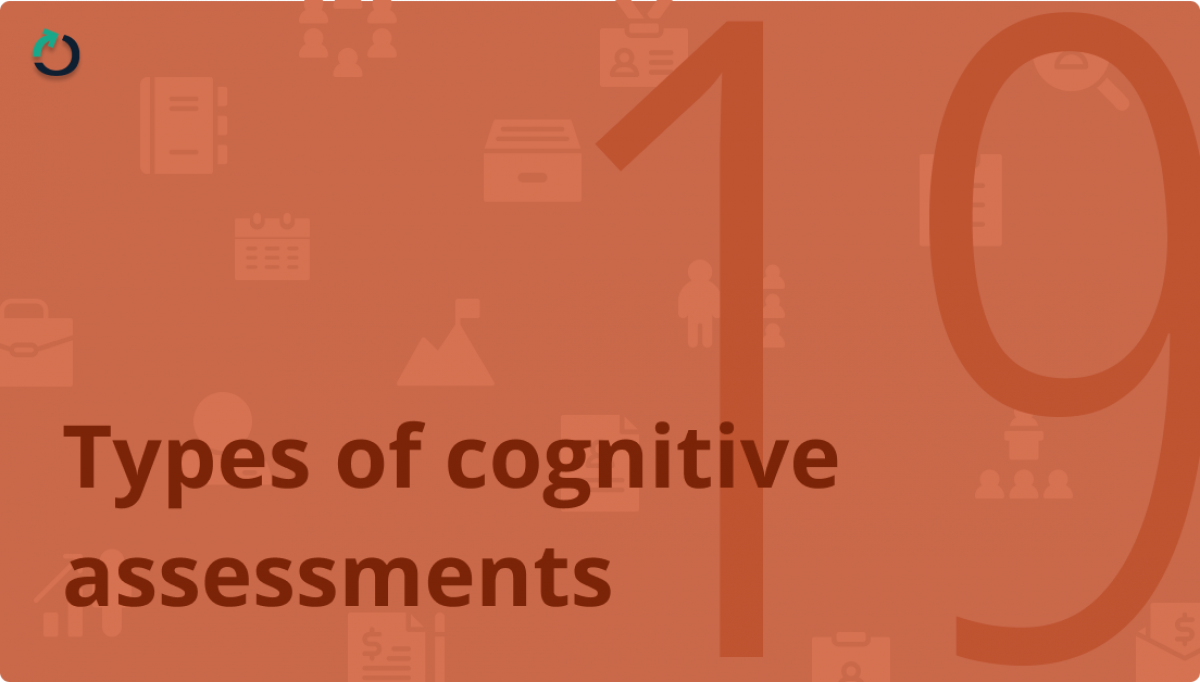If cognitive pre-hiring assessments measure the cognitive skills of the candidates, which loosely comes under the innate skills tab, why do we need different types of cognitive assessments? Especially since IQ tests supposedly measure those innate abilities in a single test.
We briefly touched on this topic in a previous article, however, we will brush up again.
The term IQ refers to the measurement of a person's general intelligence, and if taken broadly enough, cognitive ability is measured by IQ testing.
That said, IQ tests are not great for pre-hiring assessments and cognitive ability assessments are. As I said, IQ measures the single General Intelligence - if such a thing exists - whereas a cognitive ability test measures multiple intelligences separately.
We at merreo don’t subscribe to the general intelligence theories. Those theories suppose that one type of cognitive test results predicts the most other test type results. That implies that there is just one type of intelligence, and one type of test is valid enough.
But the more widely accepted and rigorously researched idea is the multiple intelligence theory. The most popular theory proposes eight different abilities. Namely,
- Musical-rhythmic
- Visual-spatial
- Verbal-linguistic
- Logical-mathematical
- Bodily-kinesthetic
- Interpersonal
- Intrapersonal
- Naturalistic
For pre-hiring assessment purposes, all of these abilities are not relevant. And all cannot be measured through a pre-hiring test. Eg. The Bodily-Kinesthetic intelligence. But the different merreo cognitive ability tests are created to assess different types of intelligence.
The Cognitive ability tests in Merreo are
- Mathematical Thinking
- Critical Thinking
- Spatial Visualization
- Abstract Reasoning
- Interpreting Data
- Numeracy
Mathematical Thinking test
The Mathematical Thinking test assesses the candidate’s ability to understand, interpret and analyze quantitative information, solve problems using mathematical models, and apply basic concepts of Algebra, arithmetic, geometry, and statistics.
What does this section measure?
- Quantitative Problem Solving
- Ability to reason, model, and solve problems with quantitative method
- Ability to reframe verbal problems into equations to solve quantitatively
- Understanding, interpreting, and analyzing quantitative information
Relevant for
The ultimate goal of this test is to measure the mathematical problem-solving ability of candidates. So this test is relevant in all places where you expect candidates to be analytically strong. As such, it is best to avoid this test if the role doesn’t demand quantitative rigor.
For example,
- Finance Analyst
- Business Analyst
- Data Analytics
- Most engineering roles
- Scientific Research roles
More on this test – Mathematical Thinking Test - Help Desk
Critical Thinking Test
The critical thinking test assesses the candidate’s ability to look at the premise and clearly understand it from multiple perspectives, separate facts from opinions and assumptions, analyze an argument and reach conclusions, develop and consider alternative explanations, and reason from incomplete patterns.
What does this section measure?
- Structured thinking
- Deductive reasoning and understanding of cause and effect
- Reasoning, Inferring, & Argumentation
- Basic understanding of the English language
Relevant for
This test is for measuring the Critical thinking ability of candidates. But, at the same time, this test being a verbal one, also measure the English skills of the candidate. So this test is relevant in all places where you expect candidates to have excellent critical thinking and English skills.
For example,
- Business and Management roles
- Consulting roles
- Product management roles
- Lawyers
More on this test - Critical Thinking Test - Help Desk
Spatial Visualization test
The visualization test assesses the candidate’s ability to think visually, spatially, and graphically. This test measures the candidate’s ability to visualize 3D objects from isometric (or) orthographic vies, rotation of those objects mentally, understanding of the formation and make-up of those 3D structures.
What does this test measure?
- Visualize three-dimensional objects
- Understanding the structure and formation of 3D shapes
- Thinking visually
Relevant for
- Mechanical Engineering
- Civil Engineering
- Architecture
- Industrial Design & more
More on this test – Spatial Visualization Test - Help Desk
Abstract Reasoning test
Abstract reasoning test is the closest thing to a general intelligence test in Merreo. Abstract reasoning is a non-verbal, culture-fair assessment of one’s overall cognitive ability. This test assesses the ability to interpret patterns, find connections, and make deductions from abstract images.
What does this test measure?
- Reasoning Ability
- General Fluid Intelligence
- Ability to interpret patterns, find connections, and make deductions
Relevant for
- All roles
This test is the most sector-agnostic of the lot, however, the use of this test must be measured. This test measures only the holistic ability of candidates, and we have a several precise tests that measure specific skills & abilities for job success in that roles.
More on this test - Abstract reasoning test - Help Desk
Numeracy test
The numeracy test assesses the candidate’s mathematical knowledge and ability. This section differs from the mathematical thinking section in the section’s emphasis on raw mathematical ability, comfort with basic operations, and strength of mathematical knowledge, rather than the problem-solving ability, as in the Mathematical thinking section.
What does this test measure?
- Comfort with basic mathematical operations and theorems
- Simplification and calculation ability
- Mental Math
Relevant for
- Accounting
- Banking
- Operations, etc
Please don’t use this test along with the mathematical thinking test.
More on this test - Numeracy test - Help Desk
Interpreting Data
The Interpreting Data section assesses the candidate’s ability to understand graphically represented data, perform rudimentary statistical calculations, solve problems and make reasoned inferences. The statistical concepts covered in this section include Mean, median, mode, basic standard deviation, trend lines, quartiles, Normal Distribution, and percentiles.
What does this section measure?
- Understanding from graphically presented data
- Basic statistics
- Making reasoned inferences based on the data
Relevant for
Most modern roles require candidates to be data savvy. This is the test that is designed to measure that.
- Finance Analyst
- Business Analyst
- Product Management
- Marketing
More on this test – Interpreting Data test - Help Desk
These are just brief descriptions of the test types. I recommend you to read our help desk articles for deeper insights on each test and to try out a couple of cognitive tests yourself to get a feel for these tests. They are free.
That’s it for this article. In the next one, we will discuss the dos and don’ts of cognitive ability pre-employment assessments.





